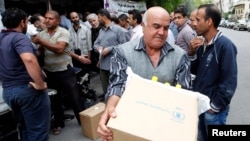The United States Agency for International Development, or USAID, recently announced a $65 million contribution to the UN World Food Program, or WFP. This will allow the organization to continue to provide emergency food assistance to some 4 million Syrians inside the country and approximately 1.6 million refugees in Jordan, Lebanon, Turkey, and Egypt. The funds will help keep WFP programs operating through November and avert an imminent shutdown.
The United States is the single largest donor of humanitarian assistance to the Syrian crisis, providing more than $4 billion to help millions of people inside Syria and beyond its borders to receive food, shelter, education, urgent medical care, and much-needed relief supplies.
USAID has now given more than $1.2 billion to WFP for its Syrian operations. This includes more than $530 million for operations inside Syria and over $693 million for operations benefiting Syrian refugees.
While USAID remains the World Food Program’s largest donor for the Syria response, a lack of robust funding from the international community has forced WFP to reduce food voucher values by as much as half for refugees, and lower the amount of food in monthly household parcels inside Syria. The United States continues to encourage other donors to alleviate these and other critical humanitarian needs. We urge all governments to fulfill unfunded pledges.
The most recent contribution from USAID has helped WFP avoid having to make additional program cuts, including curtailing all emergency food assistance to Syrian refugees in Jordan who live in host communities, which would have begun August 1st.
“We have heard tragic stories of hungry refugees returning to war-torn Syria and taking children out of school to beg,” said Dina Esposito, Director of USAID’s Office of Food for Peace. “We hope this new funding will help mitigate such difficult choices and help Syrians as the winter months approach.”
Since 2013, the WFP voucher program, funded significantly by USAID, has provided critical food assistance to Syrian refugees while also contributing about $1 billion to the economies of Jordan, Lebanon, Turkey, Egypt and Iraq, all nations who have so generously opened their doors to refugees. Inside Syria, WFP’s food parcel distributions have helped feed millions of conflict-affected people.
The United States remains committed to working with international partners to help meet the desperate food needs of the Syrian people.

















